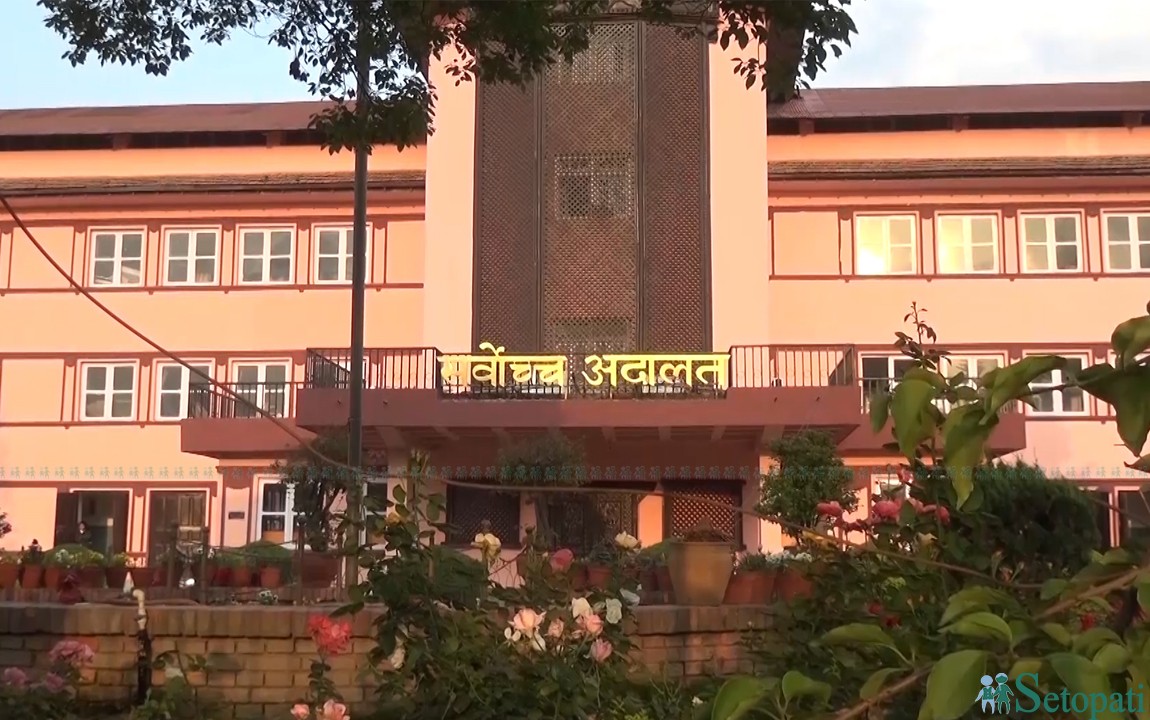The Supreme Court (SC) has been moved against the Office of Attorney General (OAG) for not trying Rastriya Swatantra Party (RSP) President Rabi Lamichhane over passport controversy.
Yuvaraj Paudel took a writ petition to the SC on Sunday against the OAG decision. The SC has decided to register the petition. “He has corrected and brought the writ petition submitted yesterday. We are in course of registering it,” SC Spokesperson Bimal Paudel told Setopati. “First hearing on the petition registered today will be held tomorrow.”
The first demand of the petition is revocation of the OAG’s decision through a certiorari order. The second demand is issue of mandamus ordering lodging a case of acquiring Nepali passport by submitting false details against Lamichhane.
The third demand is issue of an interim order ordering to not implement, or cause to implement, the OAG decision to not try Lamichhane.
Article 158(2) of the Constitution has authorized the OAG to take a final call on whether to lodge a case on behalf of the government or not. But Paudel’s petition argues that the authority cannot be exercised arbitrarily.
Paudel has cited the SC’s interpretation in the case of Mohammad Aftab Alam pointing that the decision to not lodge a case cannot be taken merely on the wishes of OAG if the accused seems to be guilty following investigations.
The petition also cites claims that RSP leaders had reached the OAG on the day the decision to not try Lamichhane was taken, and demanded that closed-circuit television (CCT) footage be investigated to find whether the claims are true.
Attorney General Din Mani Pokharel on March 20 had decided to not lodge case against Lamichhane.
The District Government Attorney’s Office (DGAO), Kathmandu had submitted a report including the decision to not lodge a case against Lamichhane to the High Court Government Attorney’s Office, Patan.
Any proposal to not lodge case has to be sent to the High Court Government Attorney’s Office, and the office will have to study the proposal and send a report to the Office of Attorney General (OAG) if it also decides to not lodge case.
The High Court Government Attorney’s Office, Patan had endorsed the decision of DGAO and submitted the file to the OAG.
The DGAO based its decision to not lodge a case mainly on four grounds.
The fact that the immigration records do not show that Lamichhane used the passport (No 08834838) acquired in 2015 as the first ground to not lodge the case, according to Neupane.
The second ground for not lodging the case is that he was a Nepali citizen by descent before becoming American citizen and his status was that of non-resident Nepali and not that of a foreigner.
The fact that the disputed passport has been revoked by the Department of Immigration and he has already reacquired Nepali citizenship has been used as the third ground by the DGAO for not lodging the case.
It has used the recommendation to not lodge a case made in the report submitted by the District Police Range, Kathmandu, after completing its long investigation on Lamichhane’s passport as the fourth reason for not lodging case.
Lamichhane was accused of acquiring a Nepali passport using his invalid Nepali citizenship certificate while he still held a United States passport.
Police were investigating a case filed against Lamichhane alleging that he had acquired a Nepali passport by providing false details.
A writ petition had been filed at the Supreme Court over Lamichhane’s citizenship controversy before that.
After the final hearing on the petition on January 27, the Supreme Court had ruled that Lamichhane was ineligible to become a lawmaker as he did not complete the process to re-acquire his citizenship certificate that became invalid after he acquired US citizenship. Lamichhane had resigned as deputy prime minister and home minister the same day.
He later reacquired Nepali citizenship. He also returned the Nepali passport acquired using his invalid Nepali citizenship.

